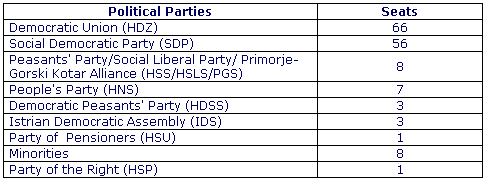News
Corinne Deloy,
Fondation Robert Schuman,
Helen Levy
-

Available versions :
EN

Corinne Deloy
Fondation Robert Schuman
Helen Levy
The Democratic Union (HDZ) won the general elections that took place in Croatia on 25th November. The party led by outgoing Prime Minister Ivo Sanader won 66 seats in the Hrvatski Sabor, the only House in Parliament. It took the lead over the Social Democratic Party (SDP), the main opposition party led by Zoran Milanovic which won 56 seats. Both parties were followed by the Peasants' Party/Social Liberal Party/ Primorje-Gorski Kotar Alliance (HSS/HSLS/PGS) which won 8 seats and the People's Party (HNS), a centre left party (formerly led by the present President of the Republic, Stepan Mesic) led by Vice President of Parliament, Vesna Pusic, which won 7 seats. The Democratic Peasants Party (HDSS) and the Istrian Democratic Assembly (IDS) each won three seats, the Party of the Right (HSP) and the Party of Pensioners (HSU) won one seat each.
These results do not include the votes of the 400,000 Croats living abroad (mainly in Bosnia-Herzegovina), traditionally greatly in favour of the Democratic Union (HDZ). The party might win at least four additional seats once their votes have been counted.
"There is no doubt about the Democratic Union's victory. Voters have shown their confidence in the HDZ and in the policy we have undertaken over the last four years," declared Ivo Sanader when the results were announced. "I have just spoken with the President of the Republic, Stepjan Mesic and I told him that I was expecting to be asked to form the new government and he agreed," he maintained.
His main rival, Social Democratic leader, Zoran Milanovic said that he had also spoken to the President of the Republic, and said "he was convinced he could rally a parliamentary majority." "We are on our way to forming a government after discussions with those who believe that Croatia needs change, a new government which has greater ability and is more honest."
One thing is certain: neither of the two parties is in a position to form a government alone. Negotiations will therefore be necessary to put a future government coalition together. "The situation will be almost identical whichever party wins. Both will serve Croatia well," maintains political analyst Jelena Lovric. Although both parties share the same goals in terms of foreign policy, the Social Democratic Party is however in support of greater State intervention in the economy, the Democratic Union is more liberal.
Ivo Sanader started his career as an editor and then became editorial director in the town of Split before starting his own company in Innsbruck, Austria where he lived between 1987 and 1991. On his return to Croatia he was appointed director of the National Theatre of Split in 1991 and was elected MP for the first time the following year. He became Minister for Research and Technology (1992-1993), then deputy Foreign Affairs Minister from 1993 to 1995, the year he became director of Franjo Tudjman, President of the Republic's cabinet (1990-1999), and secretary general of the National Defence and Security Council. From 1996 to 2000, he became deputy Foreign Affairs Minister again and became president of the Democratic Union (HDZ) when Franjo Tudjman died. After this party's victory in the general elections on 25th November 2003, Ivo Sanader was appointed Prime Minister.
During his term in office the outgoing Head of Government has greatly improved Croatia's chances of joining NATO and the European Union. The country presented its candidature for membership on 21st February 2003. Brussels granted it official candidate status in June 2004 and accession negotiations started in October 2005. Croatia, which has already opened 14 negotiation chapters (and concluded 2) should logically be the next country to join the Union. Croatia was also elected member of the UN Security Council on 16th October last; "the greatest success achieved by Croatian foreign policy after the acknowledgement of the country's independence," in the opinion of Stepjan Mesic, President of the Republic. Ivo Sanader's government did however fail in its fight against corruption just as it has not been able to apply the vital reform of the legal system.
"Whoever the winner is, reforms should be applied more quickly and accession negotiations to the EU should be completed. And if intelligence is applied matters will be clearly cut in the first year of government," stresses political analyst Zeljko Trkanjec. Many reforms are indeed necessary in preparation for Croatia to integrate the European Union, an absolute priority for both political parties. In terms of foreign policy "there is no difference between the two," says political analyst Davor Gjenero. Ivo Sanader's Democratic Union and the Social Democratic Party led by Zoran Milanovic share the same goals: winning an invitation to join NATO at the next summit in Bucharest in April 2008 and to join the EU in 2010.
General Election Results - 25th November 2007 in Croatia

Sources: Agence France-Presse http://www.izbori.hr/2007Sabor/index.html
On the same theme
To go further
Elections in Europe
Helen Levy
—
24 February 2026
Elections in Europe
Helen Levy
—
10 February 2026
Elections in Europe
Corinne Deloy
—
20 January 2026
Elections in Europe
Corinne Deloy
—
13 January 2026

The Letter
Schuman
European news of the week
Unique in its genre, with its 200,000 subscribers and its editions in 6 languages (French, English, German, Spanish, Polish and Ukrainian), it has brought to you, for 15 years, a summary of European news, more needed now than ever
Versions :


